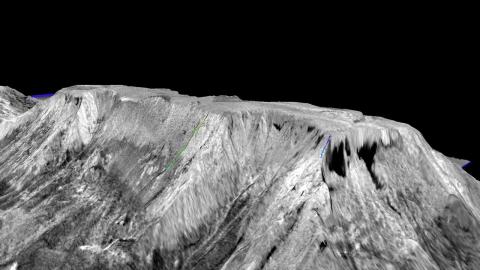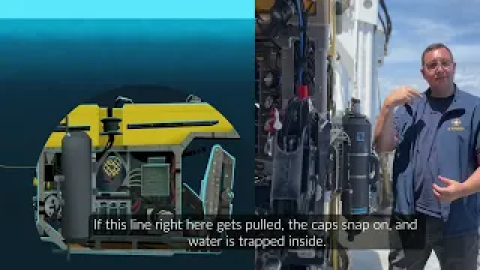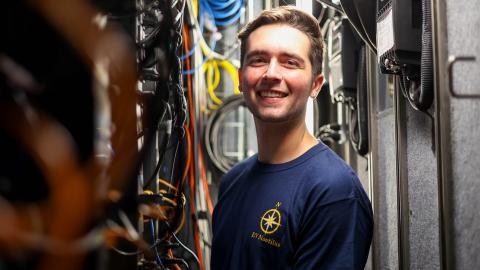Meet Ocean Explorer Ophelia Christoph
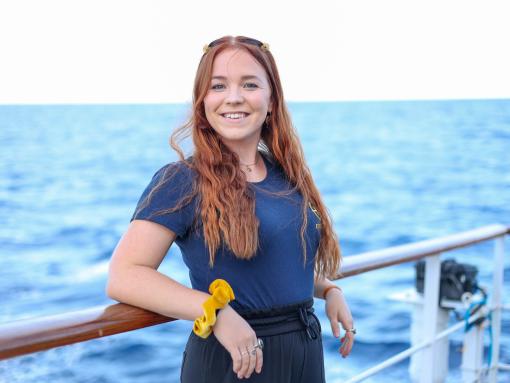
OET is proud to welcome Ophelia Christoph to the Corps of Exploration as part of the Science & Engineering Internship Program. This internship program supports community college, undergraduate, and graduate students in building professional workforce experience and exploring STEM-related careers that connect to research themes like robotics, ocean science, education, and exploration. Ophelia is spending 12 days aboard E/V Nautilus as a seafloor mapping intern characterizing deep-sea features in international waters between Canada and Hawaiʻi, filling gaps in seafloor mapping coverage, and supporting priorities of the Nippon Foundation-GEBCO Seabed 2030 Project, the US National Strategy for Ocean Mapping, Exploration, and Characterization, and the United Nations Decade of Ocean Science for Sustainable Development.
We sat with Ophelia to learn more about her experience at sea and the path that led her to Nautilus.
Can you tell us a little about your background? What influenced you as a child?
Growing up, I lived all around the country. I was born in Delaware, but I’ve moved 32 times during my life. When we get to port in Hawaii at the end of this expedition, it will be the 48th state I’ve been to, so I’m getting close to seeing them all. I grew up with my mom and eventually my little brother, but no matter where we were, I’ve always cared about the environment.
When I was really little, maybe around two or so, I saw the movie “FernGully: The Last Rainforest.” It’s about this little fairy with magical powers, and she goes around saving the rainforest from humans trying to destroy it. And I remember telling my mom, “I’m gonna save the world, I’m gonna do it.” So I’ve always cared about the environment, and have known that I wanted to work to protect it.
What did you study in school?
As I got older, my desire to protect the environment evolved into a more concrete goal. In high school I decided to go to school for environmental science. When I got to college, I walked into my offshore wind class, and I immediately knew I was in the right place – I thought I want to do this forever. I really enjoy learning about renewable energy, and I think it’s the best way to help move the future in the right direction.
What kind of work are you doing now?
After college I worked for a while, but I really wanted to go back to school. Eventually I sent a message to a professor I had at the University of Delaware, where I went for undergrad, and now I’m working with him as I pursue my Ph.D. in Geological Sciences. My research is on the geological implications of sediments on the continental shelf of the Mid-Atlantic Bight for the purposes of offshore wind development. Basically, the east coast has fairly good bathymetry data, but in order to put a foundation down you also need sub-bottom data, which tells you about what’s beneath the surface of the seafloor. This is because certain foundation types do better in certain sediments. This sub-bottom data is very limited in my research area. Part of my work is to gather data to create suitability models and recommendations for foundation types.
What’s next for you?
I would really like to become a professor. I love to teach and have been working as a teaching assistant at University of Delaware. In fact, they thought I was doing such a good job that they actually asked me to teach my own course, which I’ve done twice now. That experience has made me like teaching even more. So, I’d really like to be a professor and to help inspire future generations to care about the environment. That’s the ultimate goal for me.
Had you been to sea before this? What’s your favorite thing about being on Nautilus so far?
This is my first time going to sea. My favorite thing so far is looking out at the ocean from the top deck. You can see everything. It makes you feel very free.
Has anything in your past helped prepare you for your time here?
My previous work with bathymetry data has helped me a lot here. Seeing how it’s collected and made into the final products I’ve used before has been really interesting. I’m also getting to see how the data is put through, any problems that come up with it, and how to troubleshoot those problems. I think what I've learned so far will be valuable in terms of how I will seek out and collect the data I need for my project going forward.
Had you heard of Nautilus before applying to this internship? How did you find out about it?
One of my graduate advisors sent me and email and said I should apply to the Nautilus internship program. I had never heard of it before she told me about it – it’s all new!
Do you have any advice for someone looking to follow a similar path?
Make a lot of connections with the people that you meet in academia. If you're nice to them, they might think of you for an opportunity you might be good for. Just get to know everybody that you meet!
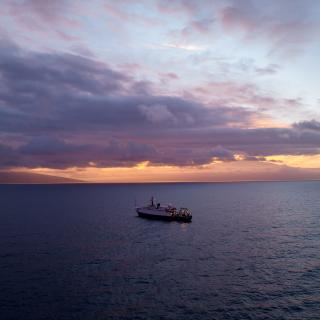
Mid-Pacific Mapping Southbound
This expedition is a seafloor mapping transit to bring the E/V Nautilus from British Columbia back to the Central Pacific where the ship will operate for the remainder of the 2023 field season. This 12-day transit route will fill gaps in seabed mapping within and beyond the U.S. EEZ and thereby support priorities of Seabed 2030 and the US National Strategy for Mapping, Exploration, and Characterization.
